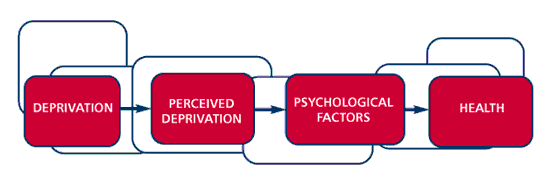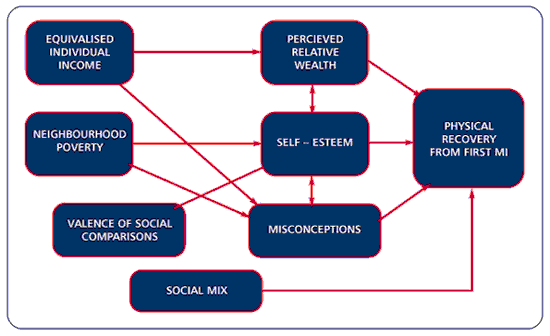 |
Close
window to return
|
Issue 8, September
2001
Relative deprivation and recovery from first
acute myocardial infarction
Malcolm MacLeod, Elspeth Graham and Marie Johnston
- The fact that inequalities in health exist in the UK is well-documented. However, there is little agreement as to whether spatial patterns are a consequence of the geographical distribution of various groups or whether there is an additional effect of context.
- Much of the available empirical evidence that seeks to address this issue has two important and related limitations: (a) conclusions are general because of the health measures typically employed; and (b) the suggested explanations for the spatial patterns in health inequality are largely speculative because little attention has been given to underlying mechanisms.
- Our study represents the first detailed investigation of the mechanisms that link social deprivation to a particular health outcome (recovery from first acute myocardial infarction (MI)) via its impact on psychological factors known to be associated with health.
- We show that those who have lower incomes, live in poorer areas, are surrounded by lower numbers of ill people, and live in socially homogeneous areas tend to make poorer recovery. Similarly, those who perceive themselves to be worse off than others tend to make poorer recovery.
- Patients with lower self-esteem and those with more misconceptions about the cause and consequences of a heart attack recover less well.
- Controlling for seriousness of MI, perceived relative wealth and neighbourhood poverty both significantly predict self-esteem, suggesting that where you live has an important impact on your self-esteem, as does how you view your own material resources relative to those of others.
- The health effects of comparing oneself with others are associated with the interpretation of the social comparison.
- Further, neighbourhood deprivation and income significantly predict whether social comparisons are interpreted positively or negatively. We also show that the interpretation given to social comparisons is related to the perception of relative wealth and to self-esteem.
- These findings allow us to identify a path between material deprivation and recovery from first acute MI which works through the impact of the former on self-esteem and misconceptions about the causes and consequences of a heart attack, and incorporates social comparison processes.
- The explanatory links we provide have the potential to contribute to the evidence base necessary for the effective development and implementation of health policy and interventions.
Background
There is
evidence that health status is affected more by relative rather than absolute
socio-economic position. It is possible that local social relativities
play a part in this relationship. The effectiveness of health policies,
therefore, may be limited because of a failure to take into account deprivation
disparities at local and national levels. Thus, improving conditions for
the poorest in society may have little or no impact if their position
relative to other groups remains static or worsens. Clearly, in order
to develop appropriate social policy there is a need to improve our understanding
of the kinds of mechanisms that underlie the relationship between deprivation
and health (Graham et al., 2000). Our project, therefore, had three specific
aims:
- To establish whether or not recovery from first myocardial infarction can be predicted by (a) the deprivation of the individual and that of their home area; and (b) the individual's perception of relative deprivation.
- To determine whether or not social comparison processes are implicated in the impact of deprivation on health.
- To explore the role of psychological factors as mediating variables in the relationship between social deprivation and health (see Figure 1).
Figure 1: Summary
of relationships explored

Data and Methods
In the study
we collected a wide range of information related to the individual patient,
their household, and their home area. We employed a prospective design
where patients (recruited from the Coronary Care Unit at Ninewells Hospital
in Dundee, Scotland) were interviewed in their own homes at 5 weeks (T1)
and again at 15 weeks (T2) post-MI. All the patients in our sample were
diagnosed on admission as having suffered an acute MI with no previous
history of MI. Our final data set relates to 219 patients who completed
both interviews. We chose to use MI patients for our study as MI offers
a definite and unambiguous onset.
Our detailed examination of the data has revealed that the relationships between deprivation and health are highly complex. We have established links between our deprivation measures and a set of psychological factors and, in turn, explored how both relate to health status at T1 and T2 as measured by Functional Limitations Profile (FLP) and Short-Form 36 Health Survey (SF36). Here, however, we report only our principal findings concerned with health change (i.e., recovery from MI).
Measures
We employed
a number of measures of deprivation: a person-based index (equivalised
individual income), and three area-based indices (neighbourhood poverty,
neighbourhood illness, and social mix), using a flexible definition of
neighbourhood. These were carefully chosen to allow us to explore the
associations between different deprivation dimensions and our measure
of physical recovery.
In addition, we constructed a measure of perceived relative deprivation/wealth
in order to test the hypothesis that health status would be influenced
by whether or not individuals perceive themselves as being deprived relative
to others.
Results
The main
results reported here relate to the specific aims outlined above.
Is the deprivation
of the individual and their neighbourhood significantly associated with
health outcome?
We tested a general model of the relationship between deprivation and
recovery from first MI by regressing physical recovery on our four deprivation
measures. All the independent variables are significantly related to recovery,
with neighbourhood poverty accounting for more of the variance in recovery
than any of the other three deprivation measures.
Individual income is predictive of recovery from first MI (such that those with lower incomes recover less well than expected given their level of physical limitation at T1), but living in a poor neighbourhood results in a significant additional health deficit. Thus, for our sample, both individual deprivation and the deprivation of areas of residence appear to impact upon recovery. One possible explanation for this finding is that poor people living in poor areas simply experience a more serious MI and thus recover less well than others. Our study suggests, however, that this is not the case. The model is stable when tested on a sub-sample of respondents (84.5% of the total sample) who experienced the least serious heart attacks, as measured by their Killip score. Our recovery measure also allows for differences in physical limitation at T1.
Does perceived
relative deprivation predict health?
We found that an individual's assessment of their standard of living in
comparison to that of others is significantly associated with physical
recovery. Those who perceive themselves to be less well-off relative to
others show poorer recovery. Further, the perception of their own relative
deprivation is significantly predicted by both individual income and neighbourhood
poverty. Where both income and neighbourhood poverty are entered as independent
variables in the same regression model, the latter ceases to be significant,
suggesting that the impact of area deprivation on perceived relative wealth
is mediated by an individual's income. Individual income still has an
independent effect.
These findings may be of considerable interest to future researchers as they provide evidence to support the use of a measure of perceived relative wealth as a general indicator of deprivation in health research.
Are social comparison
processes implicated in the perception of relative deprivation?
Our analysis shows that neighbourhood poverty significantly predicts the
interpretation of comparisons, with those living in the poorest neighbourhood
quintile being almost 14 times more likely to make a negative comparison.
Even controlling for an individual's income, the effect of neighbourhood
poverty on comparison valence remains significant. Specifically, the quintile
who live in the most deprived areas are 10 times more likely to have made
a negative comparison than those who live in the least deprived areas.
This indicates that the observed relationship between neighbourhood poverty
and interpretation of comparison (i.e. viewed positively or negatively)
is not being driven by the individual's income but that neighbourhood
poverty is exerting its own independent effect. Comparison interpretation
was also found to be significantly associated with perceived relative
wealth. Those who make negative comparisons tend to perceive themselves
as being relatively more deprived than those around them.
Do psychological
factors mediate the relationship between social deprivation and health?
Although we found a range of psychological factors (including depression,
anxiety, optimism, perceived control, and perceived stress) to be both
predicted by our measures of deprivation and, in turn, to predict health
status at T2, these were unrelated to our measure of recovery from first
acute MI. However, self-esteem and misconceptions about the causes and
consequences of a heart attack were predictive of recovery.
We also examined the relationship between our measures of deprivation and self-esteem. We found that, after controlling for health status at T1, neighbourhood poverty and the perception of relative deprivation best predict self-esteem. Those who live in poorer neighbourhoods and perceive themselves to be less well off than others, also show lower self-esteem. This is an interesting finding as it suggests that where you live and how you view your own material resources in comparison to others may have a greater impact on self-esteem than your income per se.
Explanatory model
of the relationships between deprivation and health
Finally, we used a series of multiple regressions in order to test possible
mediating effects of perceived relative wealth, self-esteem and misconceptions
about the causes and consequences of a heart attack. Since perceived relative
wealth and self-esteem together predict physical recovery when entered
in the same model, we conclude that self-esteem does not mediate the effect
of perceived relative wealth on recovery. Nevertheless both perceived
relative wealth and self-esteem do mediate the effects of neighbourhood
poverty on recovery. Perceived relative wealth (but not self-esteem) also
mediates the effects of individual income. Similarly, our measure of misconceptions
about a heart attack predicts recovery independently of perceived relative
wealth but, in this case, the effects of both income and neighbourhood
poverty appear to be mediated by misconceptions about the causes and consequences
of a heart attack. The relationships we have found are summarised in Figure
2.
Figure 2: Model
depicting pathways between deprivation and health as indicated by our
analyses

Policy Implications
While larger
data-bases will be required in order to confirm the importance of these
observed relationships, this project represents a significant step forward
in our understanding of the mechanisms which link social deprivation to
health.
This project was funded by the ESRC Health Variations Programme from August 1997 to July 2000.
For further information, please contact:
Dr Malcolm MacLeod
School of Psychology
University of St. Andrews
St. Andrews
Fife
KY16 9JU
Email: mdm@st-andrews.ac.uk
Telephone: 01334 462064
Selected publications:
Graham, E., MacLeod,
M. D., Johnston, M., Dibben, C. and Briscoe, S. (2000) 'Individual deprivation,
neighbourhood and recovery from illness'. In H. Graham (Ed.), Understanding
Health Inequalities Buckingham : Open University Press pp. 170-185.
Graham, E., Dibben, C., MacLeod, M. D., Morgan, I. and Johnston, M. (in
press) 'How does relative deprivation affect health? The case of recovery
from first myocardial infarction' In P. Boyle, S. Curtis, T. Gatrell,
E. Graham and E. Moore (eds.), The Geography of Health Inequalities
in the Developed World. Aldershot : Ashgate.
Johnston, M., McGee, H., Graham, E. and MacLeod, M. D. (in press) 'Beyond
the socio-demographics: from prediction to explanation of the effects
of gender and social deprivation in recovery from myocardial infarction'
Annual Review of Gerontology and Geriatrics, 19.
MacLeod, M. D. (1999) 'Why did it happen to me? The role of social cognition
processes in adjustment and recovery from criminal victimisation and illness'
Current Psychology , 18, 18-31.
MacLeod, M. D., Graham, E., Johnston, M., Dibben, C., Morgan, I. and Briscoe,
S. (1999) 'Social deprivation and recovery from myocardial infarction:
The role of social comparisons' in F. Navarro-Lopez (ed.), XXI Congress
of the European Society of Cardiology. Bologna, Italy : Monduzzi Editore
(pp. 967-971).